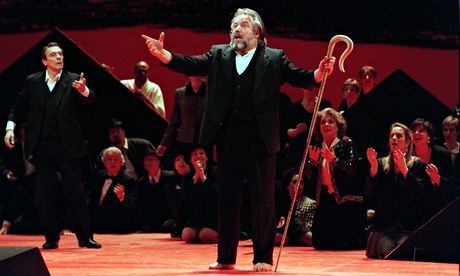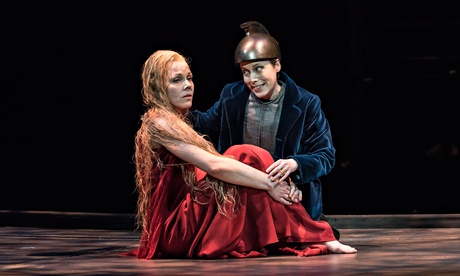The 80-strong chorus of the Welsh National Opera is simulating an orgy in a Cardiff rehearsal room. One bare-chested man is waving his shirt above his chest, couples are in clinches in the back rows and, a few feet from me, a man and woman have been grappling on the floor, while I maintain a polite rictus. "Haven't you two finished yet?" jokes a colleague.
This is Arnold Schoenberg's bracingly austere Moses und Aron, one of the most difficult of operas for audiences –at least for those not steeped in Kantian transcendental idealism, Schopenhauer's metaphysics, 12-tone serialism or the more abstruse questions of Jewish conceptions of the divine. It is soon to receive its first staged British production since 1976.
But it would be unfair to suspect that choral sex is a cynical producers' ploy to make Schoenberg's two-act opera palatable to audiences who might otherwise run away from the Wales Millennium Centre with hands over their ears. Yes, the opera is forbidding both in dramatic theme (the ineffability or otherwise of God) and in music (the score is so mathematically pure in its 12-tone conception that Schoenberg dropped one of the As from Aaron's name so that the opera's title has 12 rather than 13 letters). But this production isn't sexing up Schoenberg, at least not unduly.
The orgy has its basis in the libretto. Picture the scene: the Israelites are in the desert having cast off their Egyptian yoke, but feel abandoned by their iconoclastic leader Moses who, for 40 days and 40 nights, has been on Mount Sinai taking receipt of a consignment of commandments. They're beginning to lose faith in the God Moses catchily describes as he addresses the burning bush in act one as "einziger, ewiger, allgegenwärtiger, unsichtbarer und unvorstellbarer" (ie unique, eternal, omnipresent, imperceptible and unrepresentable).
What they want is a tangible god who can help them in their adversity. So, while his brother Moses is away, Aron makes them a golden calf to worship. Schoenberg's stage directions indicate that the Israelites' subsequent dance around the idol culminates in rape and murder, and calls for expensive props – not least live camels and naked virgins.
But WNO's Moses und Aron will not be lavish. There will be no camels, no golden calf. Instead, it's the conceit of Jossi Wieler and Sergio Morabito's production that the Israelites are watching a film that depicts sex, violence and the slaughter of virgins: the audience have to imagine rather than see the on-screen spectacle that drives the Israelites into the aforementioned frenzy. Whether this cost-effective device is dramatically powerful enough remains to be seen.
This first British production for nearly 40 years strives also to be topical. "It's very much influenced by the Arab spring," says Sir John Tomlinson, the great British bass, who sings Moses. "Much of the action takes place in an assembly which is supposed to bring to mind the Egyptian parliament – the people there are wanting liberation."
The production, though, remains true to the sibling clash at the heart of the opera – between Moses and his brother Aron. Tomlinson says of his character: "He will not describe God. He refuses to describe what God wants for his people. To do that is to limit God, which is blasphemous.
"But then this raises the question: what's the point of God if nobody knows what he wants? And Moses can't – or won't – say. He is the leader, the figurehead, but he can't speak to the people. Aron takes over and gives them what they want."
The temperamental and philosophical differences between Moses and Aron are expressed in music. While Aron sings in seductive bel canto and, like a biblical Don Draper, titillates the masses with fatuous imagery, Schoenberg scored Moses in a halting bass Sprechstimme (sung speech) that makes him sound harsh, borderline inarticulate.
Intriguingly, in an opera where Moses argues it is impious to represent God at all, Schoenberg scored the voice of God in six different ways, giving him three sung and three spoken voices – another oddity given that Moses is insisting on monotheism over pagan polytheism.Schoenberg was attracted to this biblical material after an incident in 1922 where he and his family fled the Austrian resort of Mattsee in the face of antisemitism. "I have at last learnt the lesson that has been forced upon me this year," he wrote to the painter Wassily Kandinsky. "It is that I am not a German, not a European, indeed perhaps scarcely even a human being (at least, the Europeans prefer the worst of their race to me), but that I am a Jew." This realisation prompted the composer, who had converted to Protestantism in 1898, to reconnect with his Jewish identity and explore his people's emergence from persecution. In the same year Hitler came to power in Germany, Schoenberg reverted to Judaism and fled to the US.
Some critics have taken Aron's creation of the people-pleasing golden calf as prefiguring the Nazis' degraded genius for imagery, or indeed akin to Hollywood's dream factory, with which Schoenberg had a difficult relationship during his Californian exile. The iconoclastic Schoenberg, argues Tomlinson, had much in common with Moses – neither were people pleasers.
Moses und Aron, though, was never finished. Schoenberg scored two acts in 1932 and wrote the libretto for a third, which is sometimes performed without music. (A performing version of the third act has been completed recently by Zoltán Kocsis.) WNO's production ends after the second act, with Moses left in the desert as Aron leads the Israelites to the promised land.
"It's a great, great piece, a philosophical and musical masterwork. But, yes, it is very difficult for audiences," says Tomlinson. He's a veteran in the role, having sung Moses for James Levine's New York Met production in 1999, and in a 2005 Bayerische Staatsoper production in Munich.
And it's not just demanding for audiences. One reason the opera is so rarely staged is that its changing time signatures and tempi make it some of the toughest music in the repertory.
"I was due to sing in Daniel Barenboim's production at La Scala," recalls Tomlinson, "but it had to be cancelled because the chorus couldn't learn it in time."
"We've been rehearsing this for 18 months," says WNO chorus master Stephen Harris. "This is such a challenge. It's such a different sound world from what we're used to."
After lunch I return to the rehearsal room. Tomlinson and Rainer Trost, who sings Aron, are locked in philosophical debate about the libretto. They're working on the scene where Moses reproves Aron for creating false idols and in fury smashes the tablets on which he has written the laws God has just entrusted to him – a baffling moment. Why does the enraged Moses destroy the signs of God's will? "Because Aron says the laws are an image, like the golden calf," explains Tomlinson. "How can we limit God by expressing his words in our ephemeral tongue? That is what the opera is about."
WNO is certainly taking a risk by staging an opera teeming with such philosophical puzzles and theological quandaries, all expressed in a musical language in which few are fluent. If you prefer easier diversions, you could always just drop in for the orgy.
• Moses und Aron is at Millennium Centre, Cardiff 24 May - 7 June, Birmingham Hippodrome 18 June and the Royal Opera House, London 25 - 26 July.











